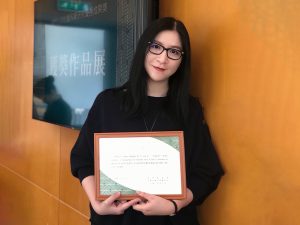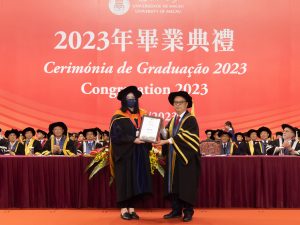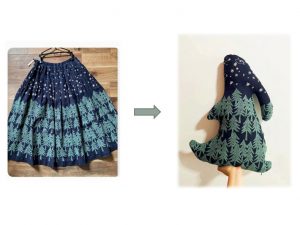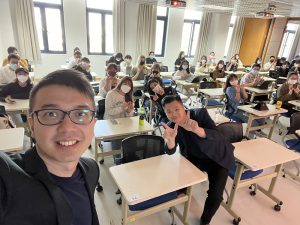‘The more positive learning experiences we create, the more fruitful the learning outcomes will be.’ This is what Fiona Yang Xi, assistant professor in the Department of Integrated Resort and Tourism Management at the University of Macau (UM), has observed from her teaching practice of ‘experience management’. At UM’s Congregation 2023 held in June, Prof Yang was awarded the UM Teaching Excellence Award for her innovative teaching methods. In this interview, she shares her experiences with enhancing students’ interest in learning and effectively engaging them to explore knowledge.
Applying concepts of the service industry to the class
In Prof Yang’s classes, students often hear some light music, which signals that the discussion session is about to start. In a lecture on ‘sustainable retailing’, part of the course ‘Retail Management in Integrated Resorts’ offered in the second semester of the 2022/2023 academic year, Prof Yang brought some book covers and dolls she made from old clothes to her class. Her goal was to initiate student discussions on the art of upcycling, a new pattern of consumer behaviour that gives used items a second life.
During the lecture, she asked her students a string of questions: Who defines the concept of sustainability? What kind of branding and promotion would be more appropriate for a company to promote the idea of sustainable retailing? What type of customers would be more likely to buy the products? How can retailers minimise their impact on the environment while improving their brand image and market competitiveness through environmental protection, social responsibility, and economic efficiency?
According to Prof Yang, the objective of the course ‘Retail Management in Integrated Resorts’ is to enable students to understand the needs and consumer behaviour of tourists in integrated resorts. She incorporates the concept of ‘experience management’ in the service industry, which involves improving the quality of service by providing customers with a good experience, into her teaching. ‘When I apply this concept to teaching, I focus primarily on imparting knowledge to my students, and at the same time, improve classroom interaction and student satisfaction, all with the aim of creating a positive learning experience. This is my teaching philosophy.’
Making students stay hungry for knowledge
After obtaining a bachelor’s degree in probability and statistics from Peking University, Yang went to the Hong Kong University of Science and Technology to pursue a PhD in industrial engineering and logistics management. During her PhD studies, she gained new insights into the information asymmetry of procurement outsourcing in supply chain management and its contractual mechanism. In addition, she began to accumulate teaching experience by working as a teaching assistant and giving lectures to undergraduate and postgraduate students.
Prof Yang joined UM in 2019. She believes that the university’s approach of placing equal emphasis on teaching and research is conducive to young scholars who aim to improve their academic standing, create new knowledge through research, and enrich the teaching content of their courses. In addition, UM has established good partnerships with higher education institutions in the Guangdong-Hong Kong-Macao Greater Bay Area, as well as with the tourism industry, which is an advantage for promoting teaching and research. In ‘Convention and Exhibition Management’, the first course she taught at UM, Prof Yang introduced the Customer Experience Scale, a scale developed for the service industry by German scholar Markus Gahler, to her class, and defined the model as ‘experience management’.
Prof Yang’s concept of ‘experience management’ consists of creating a dynamic and attractive learning environment in which students are immersed in a cognitive learning experience through sensorial, physical, affective, relational, symbolic, and cognitive dimensions.
Prof Yang often designs interactive exercises for her class to stimulate discussions and open up students’ senses, bodies, and emotions. According to her student Ng Chi Cheng, Prof Yang’s classes are lively and interesting. She also explains many current case studies in detail, and is very patient when answering questions. ‘Prof Yang brings up real-life examples in her lectures, and her logic is clear. She is an excellent teacher who shows empathy towards her students and has a strong interactive teaching ability,’ said Arthur Wong, a student from Australia.
Prof Yang advocates a hands-on approach to teaching. ‘I ask my students to take part in the process of strategy optimisation instead of only listening to me explain the concepts of marketing strategies.’ Taking the course on brand marketing as an example, she brought several beverages to class, removed their packaging, and asked her students to take a ‘blind test’ and choose which drink tasted better. The goal was to make students aware of the importance of branding. Furthermore, when Prof Yang explained the concept of the ‘blind box economy’, she also constructed some blind boxes so her students could experience the excitement of unpacking blind boxes. These hands-on activities enabled students to gain an in-depth understanding of brand value, market positioning strategies, and marketing tactics, and to think about how to create a brand image that is attractive and recognisable, as well as how to design products and marketing models that better meet consumer needs.
To keep her students attentive and engaged in class, Prof Yang often incorporates multimedia elements such as images, videos, and audio into her lectures. She also sets up surprise quizzes on a game-based interactive platform where students use their smartphones to answer questions in real time. A countdown sound effect for each question creates a sense of tension.
According to Prof Yang, ‘Under multisensory stimulation, students’ learning emotions, such as deep inspiration, excitement, nervousness, and confusion, will emerge naturally. These emotions will then gradually transform into a thirst for knowledge that improves their understanding of the content and their learning outcomes.’
Incorporating research findings into discussions
Prof Yang’s research interests include tourists’ psychological perceptions and consumption decisions, and she has published almost 40 papers. In the first half of 2023, ten of her papers were accepted by international journals such as Journal of Travel Research, Annals of Tourism Research, and International Journal of Hospitality Management, and she was the first author on five of them.
She often presents the latest research on tourist consumption patterns and factors affecting travel intention in order to familiarise students with development trends in the tourism and leisure industry, market demand, consumer behaviour, and other relevant knowledge. She hopes that students grasp the core content of courses by analysing different studies, thereby leveraging their analytical skills to deal with future market competition and helping companies improve their competitiveness.
A recent study by Prof Yang shows that tourist behaviour is influenced by political factors and that tourists may have different perceptions of destinations depending on their national identity. ‘They are more inclined to visit countries that are friendly to them or that have extended support to their home country,’ she explained. ‘Hence, they show more interest in visiting those countries and learning about their history and culture.’
Prof Yang added: ‘By understanding different research findings, students are able to analyse tourist behaviour from a scientific point of view. They can also develop effective business strategies and management plans, or design tourism and leisure products that meet the needs of the market and customers.’
Guiding students to think
The Department of Integrated Resort and Tourism Management in the Faculty of Business Administration was established in 2019. It has demonstrated strong teaching and research capabilities in the past three years. The department has also made outstanding contributions to the development of the tourism and hospitality industry. Its programmes in Hospitality and Tourism Management were ranked 22nd in Shanghai Ranking’s Global Ranking of Academic Subjects 2022, 5th in Asia, 3rd in Greater China, and 1st in Macao. The programmes were also ranked among the top 100 universities in the world in the QS World University Rankings, 51 to 100 in Hospitality and Leisure Management. Serving as the programme coordinator of the master’s degree programme in international integrated resort management, Prof Yang works with the faculty members to design, develop, evaluate, and improve the curriculum, with the aim of nurturing outstanding management and marketing professionals for international integrated resorts.
In the face of a complex and dynamic future, Prof Yang wants her students not only to acquire professional knowledge, but also to be aware of the changes taking place in the real world. For example, can technology replace human beings in the high-end service industry? ‘This is a simple question, and students can find the answer by observing in their daily lives,’ she said. ‘At McDonald’s, you can use the self-service kiosk. But in a high-end restaurant, a waiter will still hand you a paper menu and introduce you to the dishes.’
‘For integrated resorts, tourists staying in luxury hotels expect warm greetings from staff and to be taken good care of in all aspects, but not cold-blooded robots.’ Summing up her teaching experience, Prof Yang believes that teaching should not be based on what is written in textbooks, but should closely follow the actual needs of society. In this way, teachers can guide students to identify problems and then solve them through self-reflection and self-learning.
About Prof Fiona Yang Xi
Prof Yang is an assistant professor in the Department of Integrated Resort and Tourism Management at the University of Macau. She obtained her bachelor’s degree in probability and statistics from Peking University, and her PhD degree in industrial engineering and logistics management from the Hong Kong University of Science and Technology. She is currently an editorial board member of the international journals Journal of Travel Research and Tourism Analysis, and has published nearly 40 papers.
Serving as programme coordinator, Prof Yang works closely with faculty members of the Department of Integrated Resort and Tourism Management to design, develop, evaluate, and improve the curriculum, with the aim of cultivating outstanding and versatile management and marketing professionals for international integrated resorts. In recent years, the University of Macau has steadily risen in the field of hospitality and tourism management in ShanghaiRanking’s Global Ranking of Academic Subjects. In 2022, the university ranked 22nd globally, 5th in Asia, 3rd in Greater China, and 1st in Macao. The programmes were also ranked among the top 100 universities in the world in the QS World University Rankings, 51 to 100 in Hospitality and Leisure Management.
Prof Yang joined the University of Macau in 2019. She received the FBA Outstanding Research Award for two consecutive academic years, 2020/2021 and 2021/2022, and was a recipient of the Faculty of Business Administration’s Incentive Scheme for Outstanding Academic Staff and the UM Teaching Excellence Award in the 2022/2023 academic year.
Text: Kelvin U, UM Reporter Huo Shiying
Photo: Editorial Board, with some provided by the interviewees
English Translation: Winky Kuan
Source: My UM ISSUE 125

Prof Fiona Yang Xi

Prof Yang receives the UM Teaching Excellence Award

Prof Yang explores with students the consumption pattern of used items through her handmade book covers and dolls

Prof Yang explores with students the consumption pattern of used items through her handmade book covers and dolls

Prof Yang invites graduates to share the latest information about the industry
